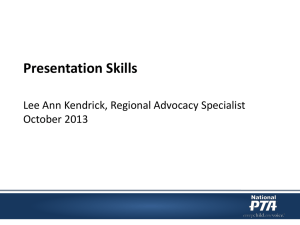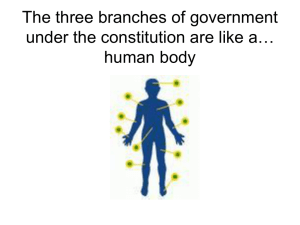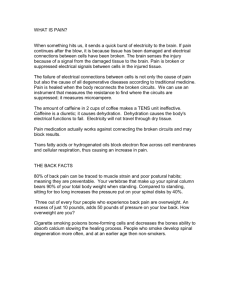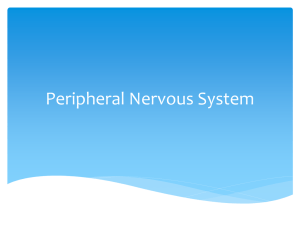Strategies for Calmi..
advertisement
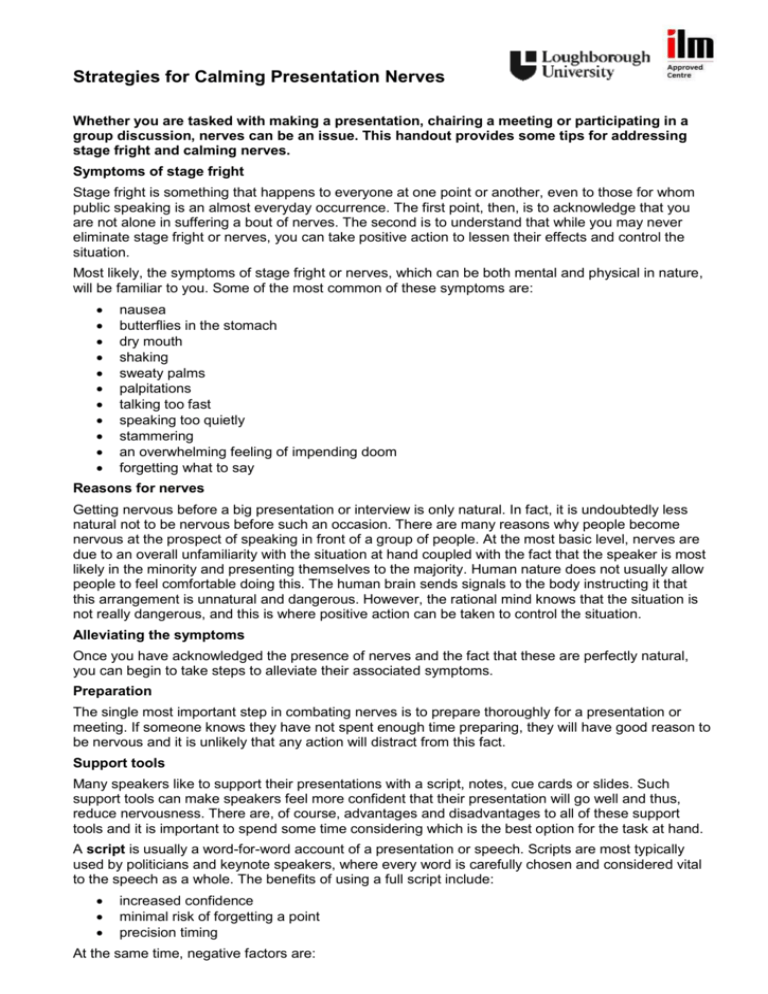
Strategies for Calming Presentation Nerves Whether you are tasked with making a presentation, chairing a meeting or participating in a group discussion, nerves can be an issue. This handout provides some tips for addressing stage fright and calming nerves. Symptoms of stage fright Stage fright is something that happens to everyone at one point or another, even to those for whom public speaking is an almost everyday occurrence. The first point, then, is to acknowledge that you are not alone in suffering a bout of nerves. The second is to understand that while you may never eliminate stage fright or nerves, you can take positive action to lessen their effects and control the situation. Most likely, the symptoms of stage fright or nerves, which can be both mental and physical in nature, will be familiar to you. Some of the most common of these symptoms are: nausea butterflies in the stomach dry mouth shaking sweaty palms palpitations talking too fast speaking too quietly stammering an overwhelming feeling of impending doom forgetting what to say Reasons for nerves Getting nervous before a big presentation or interview is only natural. In fact, it is undoubtedly less natural not to be nervous before such an occasion. There are many reasons why people become nervous at the prospect of speaking in front of a group of people. At the most basic level, nerves are due to an overall unfamiliarity with the situation at hand coupled with the fact that the speaker is most likely in the minority and presenting themselves to the majority. Human nature does not usually allow people to feel comfortable doing this. The human brain sends signals to the body instructing it that this arrangement is unnatural and dangerous. However, the rational mind knows that the situation is not really dangerous, and this is where positive action can be taken to control the situation. Alleviating the symptoms Once you have acknowledged the presence of nerves and the fact that these are perfectly natural, you can begin to take steps to alleviate their associated symptoms. Preparation The single most important step in combating nerves is to prepare thoroughly for a presentation or meeting. If someone knows they have not spent enough time preparing, they will have good reason to be nervous and it is unlikely that any action will distract from this fact. Support tools Many speakers like to support their presentations with a script, notes, cue cards or slides. Such support tools can make speakers feel more confident that their presentation will go well and thus, reduce nervousness. There are, of course, advantages and disadvantages to all of these support tools and it is important to spend some time considering which is the best option for the task at hand. A script is usually a word-for-word account of a presentation or speech. Scripts are most typically used by politicians and keynote speakers, where every word is carefully chosen and considered vital to the speech as a whole. The benefits of using a full script include: increased confidence minimal risk of forgetting a point precision timing At the same time, negative factors are: skill and practice required to sound natural minimal eye contact the speaker is tied to the lectern/podium scripts are inflexible and are very difficult to change at the last moment Notes typically include: main headings subheadings a brief outline of each point The advantages of notes are that the speaker can make more eye contact with the audience and that additions or subtractions can be made at the last minute. Cue Cards contain much less information so the chance of forgetting certain sections is much higher. However, cue cards are much more discreet so the speaker appears to be speaking without notes. Like notes, cue cards also allow you to quickly add/subtract sections very quickly. Slides work very well as memory joggers and also take the direct focus of the audience away from the speaker at certain points, which can serve to lessen nerves. However, it is vital that slides and visual aids are only ever used as supplementary aids and that the presentation could stand alone without them. Rehearse and visualise Once the speaker has all the information to be included, and decided which support tools, if any, they are going to use, it is good practice to rehearse the speech over and over until the speech is largely committed to memory. It can also be helpful in terms of reducing nerves, if the speaker visualises him/herself giving a successful speech and focuses on this in the lead up to the presentation itself. Controlling the voice With practise, the tone, pitch, volume and clarity of the voice can be improved upon. To improve tone, it is best to relax the limbs and stand in a natural, upright position. Acquiring relaxed limbs can seem like an impossible task when nerves kick in, but a few gentle head, neck and shoulder exercises before the presentation should help. Some people worry that the pitch of their voice is not suited to presentations, especially when nervous. When someone is nervous the pitch of their voice tends to be higher. Warming up the vocal chords by sipping a hot drink and exercising the voice will help produce a lower pitch and a deeper, warmer voice. A louder speaking voice is acquired by increasing the pressure of air coming from the lungs. This should be practised in the days leading up to the presentation by using the stomach and chest muscles to push the voice through the lungs. Clarity of voice is essential in presentations and is preserved by controlling the tongue and lips. To improve clarity, the speaker should relax their tongue before the presentation and to exaggerate the movement of their lips and mouth slightly more than usual. Psychological scenarios Some people use psychological scenarios to great effect in controlling their nerves before a presentation or interview. Three common scenarios are: 1. The bag of nerves Just before the speaker gets up to give the presentation, they let themselves get as nervous as possible – letting it all out so to speak. Then, they rein in all these feelings and visualise themselves putting the feelings into a big bag and tying it up or zipping it closed. They then say to themselves: “I’ve got rid of all my nerves. They’re closed up in that bag and they will not influence me today.” 2. The most dismally, embarrassing performance ever In this scenario, the speaker thinks about a particularly embarrassing event in their lives, reflecting on how bad and awful it was. They then focus on how they got through it, what they learned from it and how it is never going to happen to them again. Working from this point, they visualise how successful the presentation will be and that they have nothing to be nervous about. 3. Psyche up The speaker develops a mantra that they say to themselves over and over again. The most common mantras include: “I can and will do this”, “There’s nothing to fear”, “I’m fully prepared, fully practised and I’ll be great.” Last minute exercises relax the neck relax the jaw relax the tongue take a deep breath and exhale slowly stand straight and relax shoulders go out and give a great presentation

